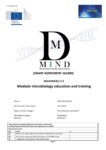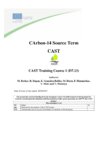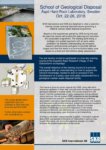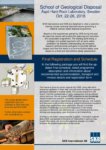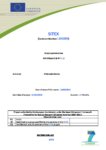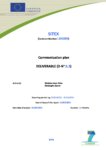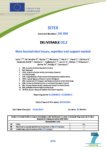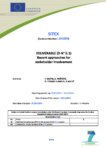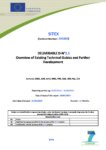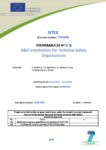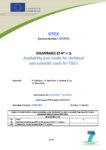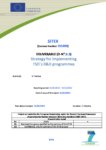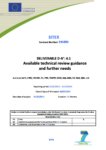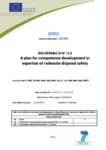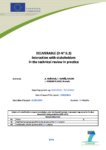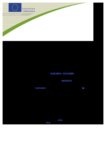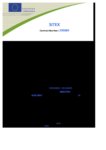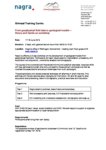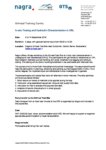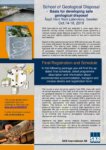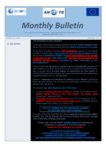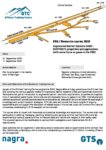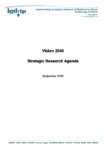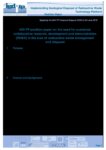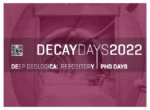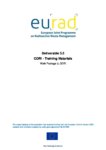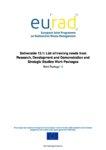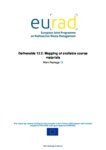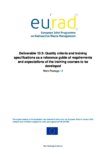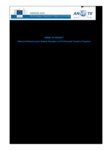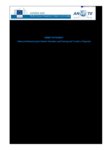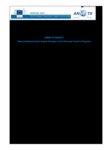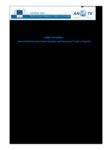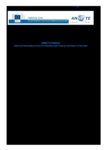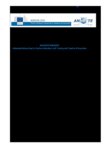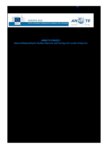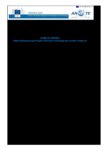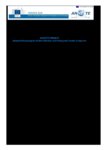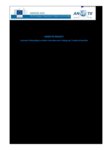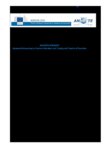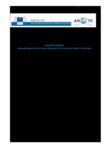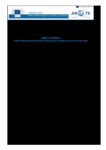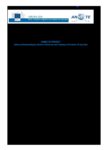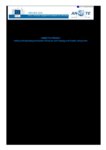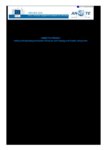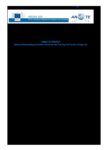Education and Training
Overview
A broad range of different types of qualifications, competence and expertise is needed for every stage of a repository development programme as defined, for example, in international guidelines (e.g. the IAEA’s safety requirements WS-R-4 and safety guide for geological disposal of radioactive waste GS-G-3.4) and in national regulations.
In terms of suitably qualified and competent personnel, the geological disposal community is fairly small. Many waste management programmes may be faced with a future skills shortage owing to an ageing workforce where many senior workers and executives are approaching retirement. There is a lack of mechanisms with few national exceptions for formal education specialised in geological disposal that could be recognised directly in the different European Member States. A solid basic education in one of the related technical or natural science disciplines is also seen as more relevant for the professionals in the field starting their career. The geological disposal specifics are generally learned on-the-job. The lack of formalisation and mutual recognition applies in a greater extent to training courses and other competence development activities undertaken by professionals in the field. There are also few formalised strategies for transmitting knowledge and insights from senior workers to those with less experience and knowledge of geological disposal. The IGD-TP can act to support recognition of learning outcomes, quality assurance of existing and new training schemes, and competence maintenance and development activities.
Objective
A more co-ordinated and formal approach to education and training in the field of radioactive waste management and disposal would be of benefit to various programmes, both at the national level and the international level, to complement existing efforts. Updating and improving knowledge on radioactive waste disposal is a common interest of the IGD-TP and can be applied to all activities undertaken to address the identified RD&D topics. The IGD-TP can co-operate with existing education and training activities through:
- mutual recognition and accreditation of programmes which meet the quality level required by the IGD-TP;
- defining requirements for the development of a framework for the mutual recognition and accreditation of training programmes;
- contributing to the identification of needs, the inventory of available resources and the conception of training programmes; and
- supporting existing and future European Fission Training schemes and other education and training initiatives and increasing the participation of their personnel in such schemes.
Related Documents
ANNETTE 2017 List of learning outcomes of ANNETTE WP2 courses
Description: The report, published in May 2017 (CIRTEN Report No. MR/ANH2020/012017 Version 1), summarises the information on ANNETTE WP2 courses in terms of learning outcomes as collected up to the date of writing (mid-January 2017).
Last updated: June 20, 2017
MIND 2016 D3.3 Modular microbiology education and training
Description: MIND Deliverable D3.3, published November 2016. The overall aim of both the education and training initiatives in MIND is to cultivate awareness of the relevance of microbial issues in otherwise typically abiotic fields of expertise, and dissipate the knowledge gained in the MIND project beyond the known geomicrobiology expert circles. For this reason, modular training courses were developed, an exchange programme for Master and PhD students has been developed and focused communication on these initiatives has been undertaken.
Last updated: November 20, 2016
CAST 2017 D7.9 All course notes for training course 1
Description: CAST - This report contains the presentations made at Training Course 1 of CAST held on 5th and 6th July 2016 at Karlsruhe Institute of Technology.
Last updated: June 23, 2017
SKB School of Geological Disposal – April 2018 announcement
Description: SKB School of Geological Disposal leaflet
Last updated: June 21, 2018
SKB School of Geological Disposal – June 2018 information pack
Description: SKB School of Geological Disposal information pack (published June 2018)
Last updated: July 5, 2018
SITEX 2013 D1.1 Project Presentation
Description: SITEX 2013, project deliverable D1.1, Project Presentation
Last updated: February 20, 2019
SITEX 2013 D1.2 Communication Plan
Description: SITEX 2013, project deliverable D1.2, Communication Plan
Last updated: February 20, 2019
SITEX 2013 D2.2 Main key technical issues, expertise and support needed
Description: SITEX 2013, project deliverable D2.2, Main key technical issues, expertise and support needed
Last updated: February 20, 2019
SITEX 2013 D5.1 Recent approaches for stakeholder involvement
Description: SITEX 2013, project deliverable D5.1, Recent approaches for stakeholder involvement
Last updated: February 20, 2019
SITEX 2014 D2.1 Overview of Existing Technical Guides and Further Development
Description: SITEX 2014, project deliverable D2.1, Overview of Existing Technical Guides and Further Development
Last updated: February 20, 2019
SITEX 2014 D3.1 R&D Orientations for Technical Safety Organizations
Description: SITEX 2014, project deliverable D3.1, R&D Orientations for Technical Safety Organizations
Last updated: February 20, 2019
SITEX 2014 D3.2 Availability and needs for technical and scientific tools for TSOs
Description: SITEX 2014, project deliverable D3.2, Availability and needs for technical and scientific tools for TSOs
Last updated: February 20, 2019
SITEX 2014 D3.3 Strategy for implementing TSO`s R&D programmes
Description: SITEX 2014, project deliverable D3.3, Strategy for implementing TSO`s R&D programmes
Last updated: February 20, 2019
SITEX 2014 D4.1 Available technical review guidance and further needs
Description: SITEX 2014, project deliverable D4.1, Available technical review guidance and further needs
Last updated: February 20, 2019
SITEX 2014 D4.2 A plan for competence development in expertise of radwaste disposal safety
Description: SITEX 2014, project deliverable D4.2, A plan for competence development in expertise of radwaste disposal safety
Last updated: February 20, 2019
SITEX 2014 D5.2 Interaction with stakeholders in the technical review in practice
Description: SITEX 2014, project deliverable D5.2, Interaction with stakeholders in the technical review in practice
Last updated: February 20, 2019
SITEX 2014 D6.1 Conditions for establishing a sustainable expertise network
Description: SITEX 2014, project deliverable D6.1, Conditions for establishing a sustainable expertise network
Last updated: February 20, 2019
SITEX 2014 D6.2 Terms of Reference (TOR) of the SITEX network
Description: SITEX 2014, project deliverable D6.2, Terms of Reference (TOR) of the SITEX network
Last updated: February 20, 2019
Description: Grimsel Training Centre Workshop Announcement: From geophysical field data to geological models – theory and hands-on workshop, June 2019
Last updated: May 16, 2019
Grimsel Training Centre Workshop Announcement: In-situ Testing and Hydraulic Characterisation in URL
Description: Grimsel Training Centre Workshop Announcement: In-situ Testing and Hydraulic Characterisation in URL, September 2019
Last updated: May 16, 2019
SKB School of Geological Disposal – July 2019 information pack
Description: SKB School of Geological Disposal information pack (published July 2019)
Last updated: July 15, 2019
ANNETTE Monthly Bulletin – Issue 15, August 2019
Description: ANNETTE Monthly Bulletin. Issue 15, August 2019.
Last updated: August 5, 2019
Grimsel Training Centre Announcement: EBS / Bentonite Course 2020
Description: Grimsel Training Centre: EBS / Bentonite Course 2020, September 2020
Last updated: February 14, 2020
IGD-TP Vision 2040 and Strategic Research Agenda
Description: IGD-TP Vision 2040 and Strategic Research Agenda, published September 2020 (reference error corrected on 26/09/2022)
Last updated: October 7, 2020
Description: IGD-TP Position Paper 2018-01 on the need for sustained collaborative research, development and demonstration (RD&D) in the area of radioactive waste management and disposal. Published September 2018.
Last updated: September 7, 2018
EURAD/CORI D3.3: Training Materials
Description: EURAD/CORI Deliverable 3.3: "Training Materials" on cement-organic- radionuclide-interactions.
Last updated: June 16, 2022
Description: EURAD Deliverable 13.1: "List of training needs from Research, Development and Demonstration and Strategic Studies Work Packages".
Last updated: June 17, 2022
EURAD D13.2: Mapping of available course materials
Description: EURAD Deliverable 13.2: "Mapping of available course materials".
Last updated: June 17, 2022
Description: EURAD Deliverable 13.5: "Quality criteria and training specifications as a reference guide of requirements and expectations of the training courses to be developed".
Last updated: June 17, 2022
ANNETTE D1.1 – Survey on E&T and VET in the Nuclear Fields in Europe
Description: Deliverable 1.1 of the ANNETTE project - Report on the ANNETTE survey on the state of the art in E&T and VET in the nuclear fields.
Last updated: July 28, 2022
ANNETTE D1.2 – Sustainable Advanced Networking in Nuclear E&T
Description: Deliverable 1.2 of the ANNETTE project - Report on the analysis of the creation of sustainable advanced networking in nuclear education training and transfer of expertise.
Last updated: July 28, 2022
ANNETTE D1.3 – Concept of an Advanced Database for Nuclear E&T and VET
Description: Deliverable 1.3 of the ANNETTE project - Report on the concept and implementation of an advanced database for nuclear E&T and VET initiatives and related events and opportunities.
Last updated: July 28, 2022
ANNETTE D1.4 – Concept of the ANNETTE Website
Description: Deliverable 1.4 of the ANNETTE project - Report on the concept of the ANNETTE platform/website.
Last updated: July 28, 2022
ANNETTE D1.5 – Effective and sustainable communication with national networks
Description: Deliverable 1.5 of the ANNETTE project - Report on the establishment of effective and sustainable communication with national networks
Last updated: July 28, 2022
ANNETTE D1.6 – European certifications for E&T and VET in relevant nuclear domains
Description: Deliverable 1.6 of the ANNETTE project - Report on the implementation of European certifications for E&T and VET in relevant nuclear domains
Last updated: July 28, 2022
ANNETTE D1.7 – Procedures for the coordinated E&T efforts planned for WP2
Description: Deliverable 1.7 of the ANNETTE project - Report on the desirable and possible procedures to be established for the coordinated E&T and VET efforts planned for WP2
Last updated: July 28, 2022
ANNETTE D1.8 – Report on Available Nuclear Facilities for Life Long Learning
Description: Deliverable 1.8 of the ANNETTE project - Report on available nuclear facilities in support of Life Long Learning.
Last updated: July 28, 2022
ANNETTE D2.4 – Implementation of the pilot courses
Description: Deliverable 2.4 of the ANNETTE project - Report on the practical implementation of the pilot courses
Last updated: July 28, 2022
ANNETTE D3.1 – Report on the criteria for selecting the E&T products
Description: Deliverable 3.1 of the ANNETTE project - Report on the criteria for selecting the E&T products.
Last updated: July 28, 2022
ANNETTE D3.2 – Summary description of the E&T products
Description: Deliverable 3.2 of the ANNETTE project - Report describing E&T products prepared in the basis of Task 3.1.
Last updated: July 28, 2022
ANNETTE D4.1 – Application of the ECVET System in the Nuclear Field
Description: Deliverable 4.1 of the ANNETTE project - Report on Application of the ECVET System in the Nuclear Field.
Last updated: July 28, 2022
ANNETTE D4.2 – Software support for competency management
Description: Deliverable 4.2 of the ANNETTE project - Report on Software Support of Competence Management extended by ECVET Implementation (User Requirements, System Specification, Small Pilot Implementation)
Last updated: July 28, 2022
ANNETTE D4.6 – Evaluation of the Exchanges and Recommendation for Future ECVET Implementation
Description: Deliverable 4.6 of the ANNETTE project - Summary and Evaluation of the Performed Steps in the Actual Exchange, Recommendations for Further ECVET Implementation in Nuclear Industry.
Last updated: July 28, 2022
ANNETTE D5.1 – Specific needs for courses on nuclear safety culture
Description: Deliverable 5.1 of the ANNETTE project - Report on the specific needs for courses on nuclear safety culture.
Last updated: July 28, 2022
ANNETTE D5.3 – Practical Implementation of Courses on Nuclear Safety Culture
Description: Deliverable 5.3 of the ANNETTE project - Report on the practical implementation of the courses on Nuclear Safety Culture.
Last updated: July 28, 2022
ANNETTE D6.1 – Competence Needs with Respect to Nuclearization of Fusion
Description: Deliverable 6.1 of the ANNETTE project - Report on the competence needs with respect to nuclearization of fusion
Last updated: July 28, 2022
ANNETTE D6.4 – Report on a pilot run of training courses on nuclear awareness for the fusion field
Description: Deliverable 6.4 of the ANNETTE project - Report on the pilot run of nuclear fusion training courses developed within WP6 of the ANNETTE project.
Last updated: July 28, 2022
ANNETTE D7.3 – Summary of Special Events and Advanced Networking
Description: Deliverable 7.3 of the ANNETTE project - Report summarizing the four ANNETTE special events related to advanced networking, organized in the frame of WP7.
Last updated: July 28, 2022
ANNETTE D7.4 – Interactions and Feedbacks for the ANNETTE Project
Description: Deliverable 7.4 of the ANNETTE project - Report on interactions with and feedback received from communities outside the ANNETTE project.
Last updated: July 28, 2022
ANNETTE D6.5 – Report on the participation of fusion professionals in nuclear training activities
Description: Deliverable 6.5 of the ANNETTE project - Report on the feedback provided by the participants in the pilot run of nuclear fusion training courses, and the conclusions and recommendations based on it.
Last updated: July 28, 2022
Related Activities
- IAEA URF network of excellence – a training programme in demonstration of technologies for waste disposal in underground research facilities.
- ITC-School Training Association – provides both theoretical and practical training and research in all aspects of science, engineering, decision-making and communication concerned with underground waste management and related environmental issues.

ANNETTE
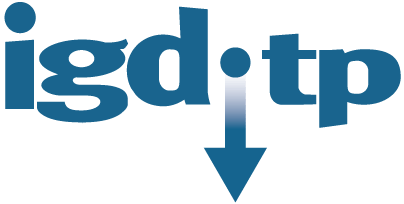
SECIGD

SECIGD2

SITEX
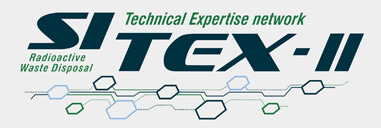
SITEX-II
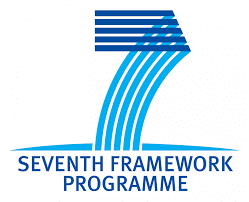
PETRUS II
PETRUS III
CARD




